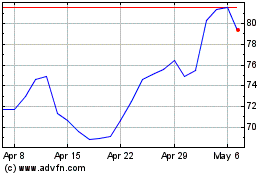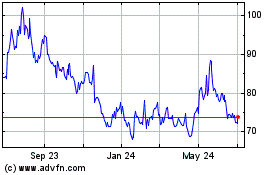By Paul Page
Sign up:With one click, get this newsletter delivered to your
inbox.
Do e-commerce companies have the tools to save beleaguered
traditional retailers? Alibaba Group Holding Ltd. is forming a
strategic partnership with brick-and-mortar retailer Bailian Group,
the WSJ's Liza Lin reports, the latest step by the Chinese online
sales giant into the physical retail business. Alibaba is trying to
find new ways to reach more customers and embed operations like its
online payment system in the consumer world. The agreement also
gives Alibaba new channel for managing goods, including
coordinating inventory and distribution between online stocks and
the goods needed for stores. Alibaba says it will "leverage the
power of big data" to manage Bailian's supply chain most
efficiently. That balance between online and store inventory has
been a challenge for retailers, and competitors will watch to see
whether Alibaba can solve that difficult equation.
After digging into a deep financial hole in recent years, some
of the world's biggest mining companies are climbing out with
copper. The industrial metal has surged more than 30% in the past
year, the WSJ's Scott Patterson reports, with demand outpacing
production while giving mining giants including Rio Tinto PLC,
Anglo American PLC, BHP Billiton Ltd. and Glencore PLC relief after
the recent commodities downturn sent them to the edge of financial
disaster. The metal's resurgence partly has been driven by a
government stimulus program in China, where over 40% of the world's
copper is consumed. But the turnaround is also driven partly by
restrained production, which explains why businesses like bulk
shipping companies aren't reaping the benefits. Demand for copper
is expected to outpace production in 2017 for the first time in six
years, and it could remain in deficit for the next three or four
years.
Kraft Heinz Co. and Unilever PLC will return to seeking savings
in their supply chains now that Kraft Heinz's $143 billion bid to
buy the rival packaged-food giant has fallen apart. The deal could
have generated upward of $5 billion in savings, reports the WSJ's
Annie Gasparro, and Kraft Heinz's decision to withdraw will revive
cost-savings plans that so far haven't matched the changes in the
food market that are pressuring both businesses. Kraft Heinz has
scaled back spending under private-equity investment firm 3G
Capital, including closing factories and consolidating sourcing for
better prices. Unilever is also paring back, looking for $1 billion
in savings over the next year, in part by acting more nimbly with
packaging and other supply decisions in local markets. Getting
bigger would help cut costs still further, but it won't respond to
the fundamental changes in the consumer packaged-goods market that
are hitting the industry's faltering giants.
SUPPLY CHAIN STRATEGIES
While some packaged-food giants are responding to nimbler
competitors by getting bigger, others are trying to bring the
upstarts into the fold. Some food giants are starting
venture-capital funds to invest in startups focused on healthier
and less-processed foods, the WSJ's Annie Gasparro reports, betting
the younger companies can teach them to be more entrepreneurial and
innovative. CircleUp, which connects private-equity firms and food
startups, says large consumer-goods companies lost $18 billion in
market share to smaller competitors between 2011 and 2015. The
investments in general have kept operations mostly separate,
rejecting the conventional approach of seeking savings by
consolidating manufacturing and supply chains. Startups say the
deals have brought help in particular areas such as packaging, but
for now Big Food seems more interested in learning from the
newcomers than in using them to build scale.
QUOTABLE
IN OTHER NEWS
The Trump administration is considering changing how it
calculates trade deficits, a shift that would make the country's
trade gap appear larger. (WSJ)
U.K. manufacturing orders rose to a two-year high.
(MarketWatch)
The IHS Markit measure of eurozone manufacturing and service
purchasing rose to its highest level since April 2011. (WSJ)
Deere & Co. says demand for its farm machinery is improving
amid signs that depressed commodity prices are recovering.
(WSJ)
German chip maker Infineon Technologies AG dropped its $850
million bid to buy a unit of Cree Inc. after failing to resolve
national security concerns. (WSJ)
Air Canada lost $136 million in the fourth quarter as rising
fuel and employee costs offset growing revenue. (WSJ)
Executives at big energy producers are considering scaling back
oil-extraction plans amid forecasts that demand will slow in the
coming decades. (WSJ)
General Mills Inc. cut its already-downbeat sales and earnings
forecast on weakening sales in the U.S. (WSJ)
Campbell Soup Co. reported weak sales in its most recent
quarter, with its fresh-food business reporting the steepest drop.
(WSJ)
Amazon.com Inc. quietly lowered its threshold for free shipping
to $35 in purchases. (USA Today)
Amazon says it will add 15,000 jobs in Europe this year, a third
of them in the U.K. (euronews)
European Union member states cleared an 18-month extension of
import tariffs on solar panels from China. (South China Morning
Post)
Some international textiles buyers are switching from China back
to Western suppliers because of China's rising costs. (Reuters)
Australia is having one of its busiest grain exporting seasons
ever, with 3.5 million metric tons of shipping capacity booked this
month. (Farm Weekly)
Toyota Motor Co. may raise wholesale steel prices it charges its
component makers to make up for rising raw materials costs. (Nikkei
Asian Review)
FedEx Corp. Chairman Fred Smith is pressing Congress to allow
twin 33-foot truck trailers on highways over opposition from
truckload carriers. (Supply Chain 247)
The Cass Freight Index of U.S. domestic shipments rose 3.2%
year-over-year in January, as freight expenditures rose for the
first time in 22 months. (Logistics Management)
Maersk Line brought one of its largest container ships to
Vietnam's Cai Mep Thi-Vai seaport to test the port's ability to
handle bigger vessels. (Viet Nam Net)
Fresh Del Monte Produce Inc. will expand import capacity by
adding container ships at Florida's Port Manatee. (Bradenton
Herald)
Gartner Inc. says more than 3 million drones will be produced
this year, 39% more than in 2016. (Material Handling &
Logistics)
Footwear manufacturer Timberland is launching a line of shoes
made of trash discarded in Haiti. (Greenbiz)
ABOUT US
Paul Page is deputy editor of WSJ Logistics Report. Follow him
at @PaulPage, and follow the entire WSJ Logistics Report team:
@brianjbaskin, @jensmithWSJ and @EEPhillips_WSJ and follow the WSJ
Logistics Report on Twitter at @WSJLogistics.
Subscribe to this email newsletter by clicking here:
http://on.wsj.com/Logisticsnewsletter .
Write to Paul Page at paul.page@wsj.com
(END) Dow Jones Newswires
February 21, 2017 06:45 ET (11:45 GMT)
Copyright (c) 2017 Dow Jones & Company, Inc.
Alibaba (NYSE:BABA)
Historical Stock Chart
From Aug 2024 to Sep 2024

Alibaba (NYSE:BABA)
Historical Stock Chart
From Sep 2023 to Sep 2024
